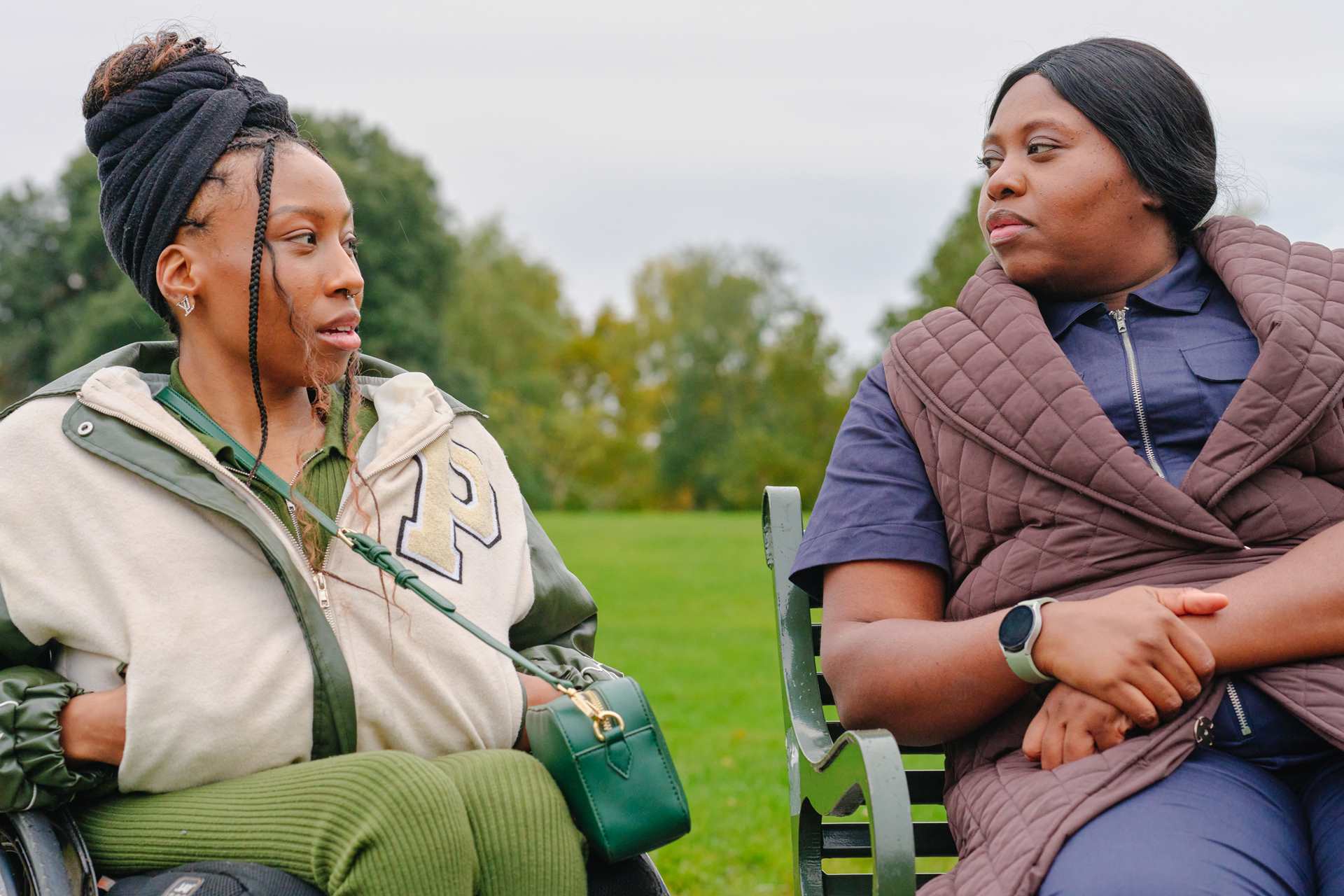What is psychosis?
Psychosis is when you see or experience reality in a very different way to other people. This could be seeing or hearing things that other people don’t, believing things that others know aren’t true, or having very jumbled thoughts and finding it hard to speak clearly.
These experiences can feel very real for you, even though they’re not. Sometimes they might be scary or confusing. Other times you might find them comforting, meaningful or even inspiring. However they show up for you, these kinds of experiences can really impact your emotions, behaviours, and how you understand yourself and the world. And that can be tough.
A psychotic episode is when you experience psychosis for a certain period of time. Some people experience just one psychotic episode in their life. Others might have episodes that come and go or are more regular. Some people even find their psychotic experiences don’t come and go but become a part of their daily experience.
If you have just one psychotic episode that lasts less than a month and isn’t linked to another diagnosis, a doctor might call it ‘brief psychotic disorder’.

Facing stigma
Psychosis is often misunderstood. You might come across negative stereotypes, or feel judged by other people, like friends, family or even professionals.
You might also feel ashamed or confused about what’s happening. But having psychosis doesn’t make you broken, weak or any less of a person. You deserve support and understanding.
The more we talk about psychosis, the more we can challenge stigma. No one should have to go through this alone.
Signs and symptoms of psychosis
Psychosis affects how you understand and make sense of the world around you. It can be different for everyone, but there are three main symptoms:
Hallucinations are when you see, hear, feel, smell or taste things that feel real to you, but aren’t experienced by other people. This could include:
- hearing voices that others can’t hear
- seeing things that aren’t really there – like people, animals, shapes, or things that look distorted
- feeling, smelling or tasting things that don’t have an obvious reason for being there – like feeling raindrops on your skin when you're indoors, or tasting something when there’s nothing in your mouth
Some people find hallucinations scary or confusing. Others find them reassuring or comforting.
Delusions are strong beliefs about reality that are not shared by other people and can be proven not to be true. But when you’re going through it, the belief can feel completely real. Delusions might involve:
- feeling like someone or something is trying to harm or control you
- believing something bad or scary is about to happen
- believing you’re being controlled, watched or followed
- thinking you have special powers or an important role, like being able to control the weather
- believing someone is in love with you, especially someone famous or powerful
- thinking something is seriously wrong with your health, even when tests show otherwise
These experiences can feel overwhelming or frightening, especially if others don’t understand what you’re going through.
Psychosis can affect how you think and speak. You might experience:
- racing thoughts – when your mind is moving so fast it feels hard to keep up
- jumping between ideas and thoughts where you see meaning and links that other people don’t
- talking very fast, using unusual words or not finishing sentences
- finding it hard to explain what you mean or to follow conversations
These symptoms can make it hard for you to focus, or sometimes for other people to understand you.
Other changes you may notice
As well as the main symptoms, psychosis can come with other experiences that affect your mood, energy and relationships. These can include:
- feeling very low, flat or withdrawn
- struggling to show emotions or express how you feel
- finding it hard to get everyday tasks done
- sleeping more or less than usual
- feeling anxious, restless or overwhelmed
- trouble with memory or concentration
- thoughts of self-harm, suicide, or hurting others
- using drugs or alcohol to cope
If you’re experiencing any of these changes to your mood and finding it hard to cope, it’s important to get help. Talk to someone you trust or contact a helpline.
Causes of psychosis
Psychosis can happen for lots of different reasons. For some people, there's one clear cause. For others, it's a mix of things. Sometimes there's no obvious reason at all.
Here are some of the main known causes:
Psychosis isn’t a mental health condition. But some mental health conditions can trigger a psychotic episode. This includes:
- schizophrenia
- bipolar disorder, especially during manic episodes
- schizoaffective disorder
- severe depression
- postnatal depression (depression after giving birth)
Some illnesses can affect how your brain works and lead to psychosis. These include:
- neurological conditions, like epilepsy, Parkinson’s or Alzheimer’s
- infections, like HIV or malaria
- autoimmune conditions, like lupus or multiple sclerosis
- hormonal or blood sugar changes, like having low blood sugar (hypoglycaemia)
- head injuries, strokes or high fevers
- brain tumours
If you're experiencing psychosis for the first time, your doctor may do tests to check if a medical condition could be the cause.
Some drugs and alcohol can trigger psychosis. This might happen when you're:
- using substances, like cannabis, cocaine, MDMA, LSD, mushrooms or ketamine
- stopping using drugs or alcohol after using them regularly
- drinking heavily, especially over a long period of time
If you’ve already experienced psychosis, taking drugs and drinking alcohol can make your symptoms worse or make you more likely to experience psychosis again. If you’re taking medication, drugs and alcohol can also stop it from working properly.
Some prescribed medications can cause psychosis as a side effect. This includes certain psychiatric drugs. You might also experience psychosis when stopping medication, especially if it’s stopped suddenly.
For more information about the side effects of specific medications, take a look at our medication guides.
Psychosis can sometimes be a response to very painful or overwhelming things you've been through. This might include:
- abuse or trauma, especially in childhood
- losing someone close to you
- experiencing racism or discrimination
If you've been through something traumatic, your brain might try to make sense of it in ways that feel real but aren’t shared by others. For example, you might hear the voice of someone who hurt you or feel like you're in danger even when you're not.
Some people also experience dissociation after trauma. This is when you feel disconnected from your body, thoughts or surroundings. For some people, dissociation can continue long after the trauma has passed and may overlap with or lead to psychosis.
However your mind responds to trauma, it’s not your fault. These experiences are signs of how deeply you’ve been affected, and how hard your mind is trying to protect you from pain that felt too much to face at the time.
Sometimes, psychosis can happen when you're under a lot of stress or not taking care of your basic needs, like:
- severe lack of sleep
- not eating enough, or going through periods of extreme hunger
- feeling very overwhelmed or burnt out
Taking care of your basic health needs, like sleep, food, and rest, can make a big difference.
Some people develop postpartum psychosis. This is when you experience psychosis in the days or weeks after giving birth.
You're more at risk of this happening if you have a diagnosis of bipolar disorder or schizophrenia, or a family history of postpartum psychosis.
Getting help for psychosis

If you're experiencing symptoms of psychosis, it's important to speak to a GP as soon as possible. The earlier you reach out for support, the more effective treatment can be. Explain to the GP receptionist your symptoms and ask for an urgent appointment. Most GP surgeries will be able to give you an appointment very quickly if there are signs you might have psychosis.
What your GP will offer
When you see your GP, they’ll do an initial assessment before referring you for further support. Here’s what this will look like:
There’s no medical test or scan that can confirm psychosis. But a GP or mental health professional can talk to you about what you’re experiencing and look at what might be causing it. They might ask questions about things like:
- what you’ve been experiencing
- how long you’ve been feeling this way
- whether you’ve used drugs or alcohol
- any medication you’re taking
- how you’ve been coping day-to-day, like with school, work or relationships
- how your mood has been, including if you’ve felt very low or high
- whether anyone in your family has experienced a mental health condition
- if you’ve harmed yourself or thought about harming yourself
These questions will help them understand what support you might need and whether to refer you to a specialist.
If your GP thinks you might be experiencing psychosis, they’ll usually refer you to a specialist team for support. Depending on your situation, age, and what services are available where you live, you might be referred to:
- CAMHS (Child and Adolescent Mental Health Services) – they support young people under the age of 18
- an early intervention team – they support people who’ve experienced psychosis for the first time, often working with people from the age of 14 or 16
- a community mental health team – they support people with complex mental health needs
- a crisis team – they support people who need urgent help, often instead of going into hospital
If you’re referred to an early intervention team, you should be offered an assessment and start treatment within two weeks. CAMHS also aims to see people as quickly as possible – usually within a similar timeframe. If things get worse while you’re waiting, you can contact your GP again or ask to be referred to your local crisis team for same-day support.
Once you’re referred, you’ll meet different professionals who work together to help you, like:
- a psychiatrist – a medical doctor who can diagnose conditions and prescribe medication
- a community psychiatric nurse (CPN) – a nurse with specialist training in mental health
- a psychologist – someone trained in talking therapies and mental health assessments
- a social worker – someone who can help with practical things like housing or money
Your team will do a full mental health assessment. This helps them understand what you're going through and plan the right support for you.
If you’re neurodivergent or have another mental health condition, it can sometimes be harder for mental health professionals to recognise psychosis right away. Your experiences might be seen as part of your existing diagnosis, or your symptoms might be misunderstood or overlooked. You might be told things like your symptoms are “just part of” your autism or ADHD, or that you’re imagining them.
This can be confusing and frustrating, especially if you feel your concerns aren’t being taken seriously. But your experiences are valid, and you deserve to get the right diagnosis and support. You know yourself best, so keep speaking up if you feel you’ve been misunderstood.
If you need urgent help
Sometimes psychosis can feel intense, confusing or frightening – especially if your thoughts, or the things you’re hearing or seeing, start to make you feel unsafe or like you might seriously hurt yourself. You don’t need to have a diagnosis of psychosis or any mental health condition to get urgent help.
If you need support straightaway:
- Call 111 and choose the option for mental health support.
- Ask for an urgent, same-day GP appointment if you can.
- If you don’t feel safe right now, call 999 or go to your nearest A&E.
If you can, try to get to a safe place or reach out to someone you trust, like a family member, friend, teacher or neighbour. Let them know what’s happening and ask them to help you get support.
You can also call a helpline at any time of day or night to talk to someone who’ll listen and help you find the next step.

Treatment for psychosis
If you’ve been diagnosed with psychosis, your treatment will usually include a mix of medication, talking therapies, and support with other areas of your life, like education, relationships or housing. A team of mental health professionals, known as your care team, will work together to make sure you get the right help.
Here’s what your treatment might involve:
Early intervention teams support people who are experiencing psychosis for the first time. They can help you understand your symptoms and offer things like:
- information to support you
- medication
- talking therapies
- support with your physical health, education or work
- help developing a crisis plan
- information and support for your family or carers
Antipsychotic medication is often one of the first treatments offered for psychosis. You might be offered medications like:
- risperidone
- olanzapine
- aripiprazole
- quetiapine
- paliperidone
- clozapine
For lots of people, antipsychotics work very well. But medication can also cause side effects that affect people differently. If the side effects are hard to cope with, tell your care team. There may be a different medicine that works better for you and it can take time to find the right one.
Talking therapies can help you make sense of your experiences and find ways to manage them. The main type of therapy offered for psychosis is cognitive behavioural therapy for psychosis (CBT-p). It supports you to change the way you think and behave so you can:
- reduce distress or anxiety
- regain a sense of control
- work towards your goals, like going back to school or work
Family therapy might also be offered if your family or carers are closely involved in supporting you. These sessions can help you understand each other better and make plans together for support and recovery.
Arts therapies can also be helpful for expressing your feelings in creative ways, especially if talking is difficult.
If you’ve had psychosis more than once or for a long time, there are services that can support you to manage your mental health and live well at home. This support might happen in your local area, at home, or in a specialist centre, depending on what’s right for you and what’s available where you live.
Here are some of the types of support you might get:
- Community care: This is support from a care team with your mental and physical health, either after a crisis or to help you stay well. Some areas also offer home visits, day centres, or supported housing if you need help with everyday things.
- Rehabilitation services: This is a more specialist type of support to help you feel more confident and independent over time. This could include help with day-to-day activities, building routines, or getting back into education or work. A team of professionals – like a psychiatrist, nurse or occupational therapist – will work with you based on what you need.
- Care coordinator: If you’re over 18 and supported by adult mental health services, you might be given a care coordinator, especially if you have ongoing or complex mental health needs. A care coordinator is a qualified professional who gets to know you, helps organise your care, and makes sure you’re getting the right support. Having a care-coordinator can be very helpful – it’s someone you can build a relationship with long-term and always work with no matter what other support you’re getting.
If you're feeling very unwell or distressed during an episode of psychosis, your care team might suggest going into hospital. This is called inpatient care. It gives you a safe space to recover and start treatment with support from mental health professionals.
Sometimes, when you're experiencing psychosis, it can be hard to recognise that you need help or to ask for it. If professionals are worried about your safety or the safety of others, you may be sectioned. This means being detained in hospital under the Mental Health Act – a law that allows you to be taken into hospital for treatment even if you don’t agree to it. This could happen before you’ve seen a GP, or if you're already in hospital and need to stay longer.
Being sectioned can feel scary or confusing. But it's a legal way to make sure you get the help you need in a safe place.
Looking after yourself with psychosis
Psychosis can feel overwhelming or frightening, especially during an episode. Treatment is important, but there are also things you can do to take care of yourself – both in the moment and in the longer term. They might not help straight away, but many people find them useful over time. Here are some things you could try.
Things you can do during a psychotic episode
-
Ground yourself in the present
Focus on what you can see, hear, smell, touch or taste. You could try breathing slowly, holding a cold object, simple exercises like jumping jacks, or naming five things you can see around you.
-
Use distractions
Some people find it helpful to watch a familiar TV show, play a game, listen to calming music, draw, or write about what they’re feeling. This can help you feel more in control.
-
Respond to voices or sensations in different ways
If you hear voices or have unusual beliefs or feelings, it might help to acknowledge them without reacting straight away. Some people talk back calmly, set boundaries with their voices, or use humour.
-
Talk to someone you trust
If you can, try to explain to someone what’s going on, even if it’s just with a few words. Letting someone know can help you feel safer and less alone.
-
Keep a comfort kit
Some people like to have a few things ready that help them feel calmer. This could be your favourite music, a soft blanket, a scented object, or notes from someone you trust.
-
Know when to ask for help
If you’re feeling really distressed, unsafe or confused, it’s okay to ask for support. If you can’t talk to someone you trust, you can always call a helpline for support.
Things you can do for yourself in the long term
Spotting what happens before an episode can help you understand your early warning signs and find ways to avoid or manage triggers. You might notice changes in your sleep, stress levels or mood. It can help to keep a diary of your symptoms or ask people you trust if they’ve noticed any changes.
Having a regular routine can help you feel more grounded. That might mean getting up and going to bed at similar times, eating regularly, or making space for things you enjoy.
Physical health affects mental health. Try to get enough sleep, eat in a way that feels good for your body, and exercise in ways that feel safe and manageable.
Some people use substances to cope with distressing feelings or experiences. But alcohol and drugs can often make psychosis worse or trigger another episode.
When you’re feeling well, it can help to plan ahead. Think about what support you’d want if things got worse again, and who you’d want involved. Making a crisis plan together with someone you trust can help you both feel more prepared.
Talking to others who’ve experienced psychosis can be a powerful part of your recovery. Peer support groups give you a chance to connect with people who understand what you're going through, share your experiences, and learn from each other.
You can find online and in-person support groups for people of all ages and backgrounds through the Hearing Voices Network.
Supporting someone with psychosis
It can be really hard to see someone you care about go through psychosis, especially if they don’t realise anything’s wrong or aren’t ready to accept help. But there are things you can do to support them and yourself, both during a psychotic episode and in the longer term.
What to do if someone is having a psychotic episode
-
Stay calm if you can
Try to stay steady, even if the situation feels scary or upsetting. Speak slowly, gently and clearly. Use a calm tone of voice, keep your body language relaxed, and give them time to respond.
-
Use simple words
Psychosis can affect how someone understands or processes information. Try to speak in short sentences and use plain language. Avoid overwhelming them with too much information at once.
-
Don’t argue with their beliefs
They may say or believe things that don’t make sense to you, but those experiences feel real to them. You don’t need to agree but try to be supportive. You could say something like, “I know this feels very real for you,” or “That sounds really frightening.”
-
Try to create a safe space
If possible, move to a quieter area with fewer distractions. Give them space if they seem overwhelmed. Helping them feel physically safe can also help them feel calmer.
-
Help them stay grounded
Some people find it helpful to focus on the present moment. You could gently guide them to do deep breathing or name things they can see, hear or feel around them. Only do this if they seem open to it.
-
Get help if it’s an emergency
If they talk about harming themselves or someone else, or you think they’re at serious risk, get help straight away. Call 999 if it’s an emergency. If it’s less urgent but you’re still worried, call NHS 111. If they already have a care or crisis team, you can contact them for support.
How to support someone with psychosis in the long-term
-
Just be there
Let them know you’re there for them, without judgement. You don’t need to have all the answers. Simply offering a calm space to talk – or just be – can make a big difference.
-
Ask what they need
They may not always want to talk about how they’re feeling, and that’s okay. But you can still offer practical support, like helping with daily tasks, attending appointments with them, or researching support options together.
-
Respect their choices
It can be hard to see someone you care about struggling. But unless they’re in danger, try not to pressure them to get help or stop certain thoughts. Support them at their own pace and let them make decisions when they’re ready.
-
Learn more about psychosis
Understanding more about psychosis can help you feel more confident in offering support. It also means you’re better placed to challenge stigma or myths. Our psychosis guide is a good place to start, and you can also find advice on the NHS website.
-
Plan for the future together
When they’re feeling more stable, talk about what might help if they become unwell again. You could work together to create a crisis plan that includes early warning signs, ways to stay calm, who to contact and what support they want.
-
Look after yourself
Supporting someone with psychosis can be emotionally draining. It’s okay to feel overwhelmed or unsure at times. You deserve support too. Talk to someone you trust, find an organisation that can support you or find a support group for families and friends.
More information and advice
Get help now
-
Hearing Voices Network
Shares information and free resources about hearing voices, seeing visions and having other sensory experiences through their website, social media, e-bulletin, newsletter and email information service.
Lists peer support groups for people experiencing psychosis and their friends and family, as well as support to set up your own group.
-
Bipolar UK
Provides information and a peer support service for people affected by bipolar, including friends and family. Find a local support group.
-
Samaritans
Whatever you're going through, you can contact the Samaritans for support. N.B. This is a listening service and does not offer advice or intervention.
- Opening times:
- 24/7

This page was reviewed in October 2025.
It was co-created by young people with lived experience of psychosis.
We will next review the page in 2028.
YoungMinds is a proud member of PIF TICK – the UK's quality mark for trusted health information.
Whether you love the page or think something is missing, we appreciate your feedback. It all helps us to support more young people with their mental health.
Please be aware that this form isn’t a mental health support service. If you are in crisis right now and want to talk to someone urgently, find out who to contact on our urgent help page.














